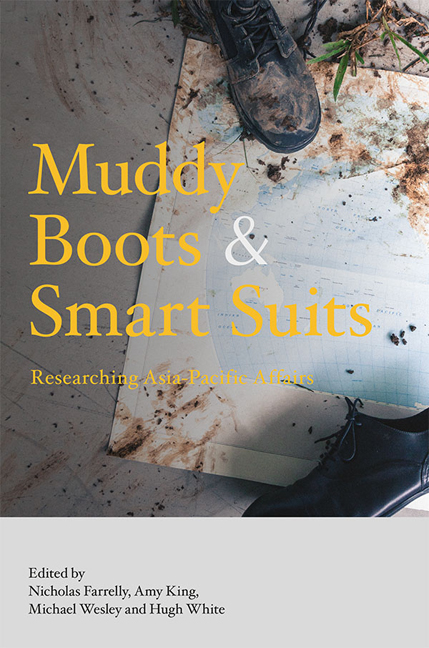Book contents
- Frontmatter
- Contents
- About the Contributors
- 1 Introduction to Research in Asia-Pacific Affairs
- Section I In the Field
- 2 Studying Policy from the Ground Up: The Solomon Islands Case
- 3 Reflections on Political Cultures in Thought and Action
- 4 Human Considerations in Conflicted Societies
- Section II Analysing Politics
- Section III Shaping a Region
- Section IV Conflict and Order
- Section V Policy and Practice
- Bibliography
- Index
3 - Reflections on Political Cultures in Thought and Action
from Section I - In the Field
Published online by Cambridge University Press: 12 January 2018
- Frontmatter
- Contents
- About the Contributors
- 1 Introduction to Research in Asia-Pacific Affairs
- Section I In the Field
- 2 Studying Policy from the Ground Up: The Solomon Islands Case
- 3 Reflections on Political Cultures in Thought and Action
- 4 Human Considerations in Conflicted Societies
- Section II Analysing Politics
- Section III Shaping a Region
- Section IV Conflict and Order
- Section V Policy and Practice
- Bibliography
- Index
Summary
INTRODUCING RESEARCH PRACTICE
In 2015, the Australian National University relaunched its famous School devoted to the study of regional politics, strategy, international affairs, and diplomacy. It had previously been known by a generic name. It was reincarnated as the Coral Bell School of Asia Pacific Affairs. At the time, some effort was put into finding quotable lines from the School's namesake, who was, for five decades, a leading figure in Australia's official and academic engagement with the Asia-Pacific region. Among her many sharp observations, one that caught my fancy was on the topic of nationalism. Bell once wrote, “Nationalism, like some wines, doesn't travel well”. This piercing thought, wrought with abruptness, reminds us that scholarly communication is, at its essence, about explanation. Making sense of the world around us, putting ideas and issues in their rightful contexts, comparing conditions across time and space, and developing models that can integrate all the different aspects of multifaceted human experiences (and dilemmas), requires a deep appreciation that, by definition, should grow over time. The cultivation of such awareness about the places that we research eventually needs to be harnessed to clear and effective language that allows other people to understand such hard-won insights. A specific mix of academic skills and other less easily quantifiable attributes seems to support the best research on politics and political cultures. Where researchers need to step outside of their own frames of cultural and political reference, the task is naturally made more difficult.
Such scholarly engagement remains the perpetual challenge of studying politics in the Asia-Pacific region, especially when we take seriously the requirement that thought and action must be understood on their own terms. The foundation for such research is a solid grounding in history, language, politics, and culture. Perhaps the best way to begin the journey of understanding a place and its people is to spend a sufficient period of time there. It is no surprise that doctoral candidates focused on political change and social upheavals are commonly advised to immerse themselves in their field research for as long as possible. This helps, naturally, with the development of language skills, but also with the expansion of social networks, the consolidation of goodwill, and the broadening of experiences, to include those that could never have been anticipated.
- Type
- Chapter
- Information
- Muddy Boots and Smart SuitsResearching Asia-Pacific Affairs, pp. 28 - 39Publisher: ISEAS–Yusof Ishak InstitutePrint publication year: 2017

